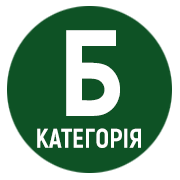ВИКОРИСТАННЯ КОМПЕТЕНТНІСНОГО ПІДХОДУ У НАВЧАЛЬНОМУ ПРОЦЕСІ УНІВЕРСИТЕТІВ УКРАЇНИ – ОСНОВНИЙ РЕЗЕРВ ПІДВИЩЕННЯ ЯКОСТІ ОСВІТИ ЇХ ВИПУСКНИКІВ
Анотація
В останні роки, як відомо, відбуваються суттєві зміни у системі підготовки фахівців з вищою освітою в університетах легкої промисловості та торгівлі. Особливо це стосується фахівців товарознавчого профілю. Ці зміни обумовлені різними причинами, а саме: потребою суттєвого підвищення якості підготовки цих фахівців, необхідністю докорінної перебудови системи стандартизації в легкій промисловості, торгівлі та вищій освіті у зв’язку з вилученням із користування стандартів колишнього СРСР, насиченням вітчизняного ринку товарами імпортного виробництва і зменшенням попиту на аналогічні вітчизняні товари, потреби переорієнтації експорту вітчизняної промислової продукції та ін. Необхідність суттєвого підвищення якості підготовки фахівців товарознавчого профілю у вітчизняних вузах легкої промисловості та торгівлі, обумовлена потребою у докорінній перебудові навчального процесу у вузах легкої промисловості і торгівлі України у зв’язку з впровадженням у навчальний процес компетентнісного підходу і контекстних форм навчання імплементації у систему вітчизняної освіти та необхідністю виконання вимог міжнародних освітніх стандартів. У даній роботі розкрито роль впровадження у навчальний процес товарознавчих спеціальностей університетів легкої промисловості і торгівлі компетентнісного підходу у формуванні якості фахівців товарознавчого профілю. При цьому, для прикладу, основна увага буде приділена підготовці товарознавців, зайнятих проблемами формування та оцінювання рівня якості та безпечності текстилю та одягу.



